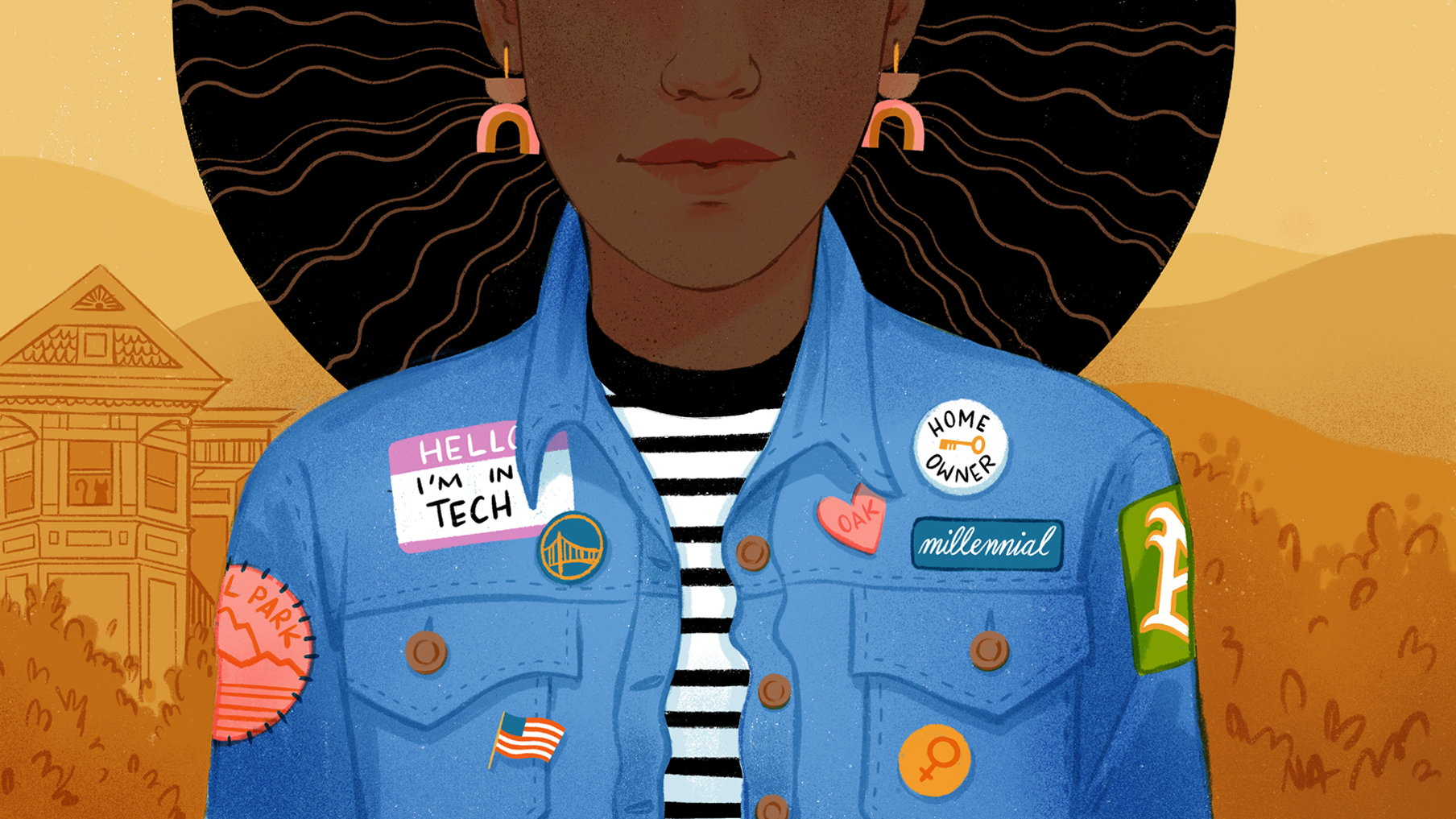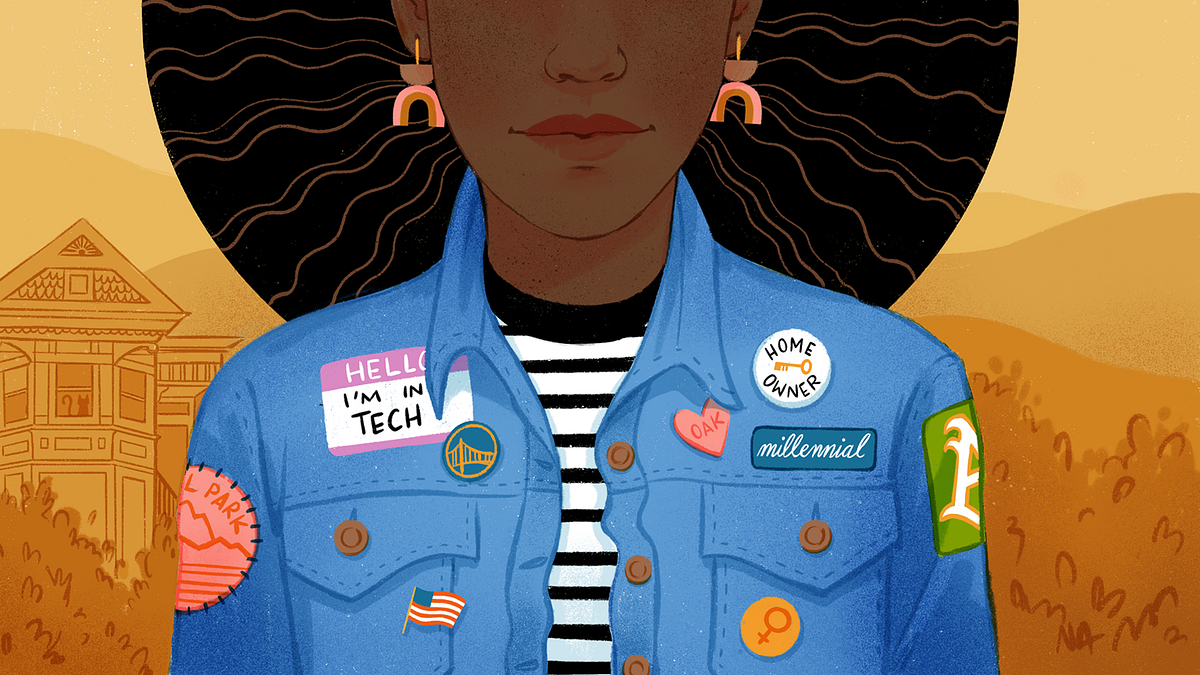
I’m a Black woman. A millennial. A tech worker. An intersectional feminist. A lover of family and community. A homeowner. And…a gentrifier?
That last title is the one I’m most unsure of. Yes, I’ve managed to purchase a condo in the rapidly changing Bay Area, but can a single woman of color, born and raised here, really be classified in the same category of people who call the police about friendly neighborhood barbeques?
I grew up in San Jose with a diverse set of friends, so much so that no one paid much attention to all our differences. We were a melting pot of jobs, colors and socioeconomic statuses. My parents worked themselves to the bone to make sure my siblings and I were raised in a safe neighborhood. They taught me the power of a dollar while also making sure that I never wanted for anything. As an adult, I understand the sacrifices they made so that I wouldn’t have to.
I know what it’s like to have people assume things about you because of how you look and the way your hair grows.
But no matter how amazing I consider the ethic of my upbringing, the fact remains: we are Black people in America. That means we had to work harder, smarter and longer and still have difficulty moving forward. I know what it’s like to have people assume things about you because of how you look and the way your hair grows.
I’ve been working since high school in various Bay Area cities, including full- time through undergrad and grad school to take better control of my finances. Learning about credit and money management served me well; it inspired me to save more than most, and I was lucky enough to have my parents help me financially numerous times when they were able to. After years of saving and searching, I ended up placing an offer on a condo in Richmond at the age of 26, moving in during my last semester of college as I started a new role at a start-up in downtown Oakland.
I had originally dreamed of owning in Oakland, but since costs were way above my budget, I settled on a reasonable commute to and from Richmond. I’d been saving for the opportunity for some time but surprised myself in accomplishing my goal at such a young age. I knew how rare and extraordinary it was.
On the day when I received my keys, I unlocked the door and just stood in the entryway. I looked at the natural light beaming throughout the place, and at the kitchen appliances that had just been replaced by the previous owner. This is mine, I thought. I looked at the closets, the faucets, the hallways. I made a point to be present, to take it all in. Of course, I’d been there before for open houses and inspections, but this was different. This was more than a set of keys — it was a symbol.
I’m used to being the minority in more ways than one, whether it be during happy hour at the bar or in strategy meetings at work. That’s the reality of being Black in the Bay Area.
I have to admit that I felt a tinge of pride when an older, whiter coworker asked bluntly how I could afford living alone when rent is so high. I was happy to correct them that yes, my mortgage is expensive. Sometimes a humble brag is wholly appropriate.
I stand out among the other homeowners in my area and certainly from those in my age group. I’m not part of an established family of four or an older retired couple. I don’t look like the other patrons in the local coffee shops, MacBook and cappuccino in hand. Instead, I’m the person they stare at a bit too long and move away from in a coworking space. I’m used to being the minority in more ways than one, whether it be during happy hour at the bar or in strategy meetings at work. That’s the reality of being Black in the Bay Area.
I hesitate to compare myself to the thousands of middle- and upper-class families who have displaced lifelong residents and contributed to rising homelessness, increased property values and the loss of local mom-and-pop shops.
Gentrification is usually defined as the of rebuilding a neighborhood more to “middle class taste,” which brings an influx of more affluent people who replace earlier, more disadvantaged. The Bay Area has become one big gentrification zone in recent decades with the tech boom, so the stats here are alarming yet, sadly, not surprising. People of color are leaving Oakland in record numbers — since 2000, the city has lost 30 percent of its Black population, according to census data. And in San Francisco, the Black population is down to less than 5 percent. The combination of rising rent costs, astronomical building leases and the growing migration of higher-earning transplants to the Bay Area are the perfect recipe for pushing out local folks.
And so, while I’m a young person in tech who now owns in a residential area of Richmond, I hesitate to compare myself to the thousands of middle- and upper-class families who have displaced lifelong residents and contributed to rising homelessness, increased property values and the loss of local mom-and-pop shops. I’m not sure that I fit the same mold or possess the same privilege. When I take a second to look around at folks who have been constantly marginalized and othered, we have more in common than not. I’m still the recipient of glares from middle-aged-and-above white people when I’m walking down the street, guilty of nothing except minding my own business. I still get met with microaggressions on an almost daily basis, whether they’re from coworkers, retail staff or random strangers.
That being said, I recognize the difference between me and the other “others” in my neighborhood. I can go home — to my home — and relax. I don’t have to fret about rising rent or my landlord making unreasonable demands or regulating my decisions. I’m fully empowered to own my space, its energy and the way my home looks and feels, without a second opinion, and I recognize that this is a major privilege that many folks may never get the chance to experience.
I’m aware of the privilege, as crazy as I feel saying it, when I can walk inside and lock the door. I can look outside my window and see the same man pushing his shopping cart full of his belongings. We’re similar at our core. We are human beings. But we are also different, mostly because of external factors and whatever detrimental circumstances he came to live through, and the world makes sure we know it.
I understand that home ownership is not everyone’s goal, but I still wish it were more attainable for those who desire it and that the disparity weren’t so stark. Nationally, nearly 73 percent of white Americans own, while that number is around 43 percent for African Americans, according to the Joint Center for Housing Studies.
I’m grateful my parents taught me about savings and investments, interest rates and negotiation strategies. I know now that many of my peers didn’t grow up having these conversations. But even when we’re armed with knowledge and desire, Black people are constantly denied access to critical information and support during the home-buying process. An analysis of the most recent Home Mortgage Disclosure Act data shows that over 25 percent of Black applicants had been denied a conventional home loan, compared to 10 percent of white borrowers.
When I look around and see so many people struggling, I wonder why, of all the people who were born and raised in the Bay Area, did I become one of the few to access even a small amount of financial power?
It’s because of these clear disparities that I feel a sense of responsibility — the need to show people not only that I am here but also that I wholeheartedly deserve to be. There are days when I’m not sure if I’m more driven by the need to prove them wrong or myself right, but either way, I’m driven just the same.
At the same time, I often find myself feeling a sense of guilt or imposter syndrome. I feel guilty for swooping in to purchase property when I see displaced folks sleeping on the street during my morning BART commute. asking, “Why me?” and “How did I get here?” It’s not that I don’t know — I saved money; I cut costs; and I found an agent who worked well within my pre-approved price range. But instead, when I look around and see so many people struggling, I wonder why, of all the people who were born and raised in the Bay Area, did I become one of the few to access even a small amount of financial power?
I have friends whose grandparents are being forced out of the neighborhoods they’ve lived in for 30 to 40 years. I’ve met people who, as much as they love their cities, cannot contend with the rising costs to eat and live and are forced to move out of state. And yet here I am, a young Black woman in tech who has managed to break the mold in some small way.
I’m constantly figuring out how to straddle the line between being a millennial in tech and a marginalized “other” who isn’t always accepted in the space. I’m proud of my accomplishments, yet I’m empathetic toward those who aren’t able to tackle housing costs.
I’ll be clear — no one has made me feel like a “sellout” for striving for success. Whenever the topic does come up in conversation, I’ve been met with a slight smile and a pat on the back or wide-eyed, halfway skeptical congratulations. This guilt that I occasionally fall victim to is a personal guilt trip largely of my own making, simply because I know that many of the people who so deserve this opportunity will never get the chance to experience it.
I’m constantly figuring out how to straddle the line between being a millennial in tech and a marginalized “other” who isn’t always accepted in the space. I’m proud of my accomplishments, yet I’m empathetic toward those who aren’t able to tackle housing costs. I’m excited to build equity and flourish in my space, but I’m sad for those who have nothing to call their own. As I continue to try to figure it out, one of my biggest realizations so far is that my experiences don’t have to fit into a particular mold. I can be proud of ownership while recognizing that it’s a rare privilege.
So the question remains…am I a Black gentrifier? I’m still not quite sure. What I do know for certain is that it’s up to me to be authentic in my truths, uplift my community and root for social change — and I’m fully invested in doing so.







